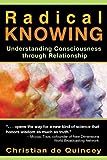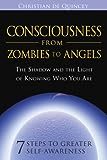de Quincey: are we noble or savage? Who among us is innocent of responsibility for the degradation our species inflicts on the natural world, says Christian de Quincey of the Wisdom Academy
Everyday, we all make choices that contribute, one way or another, to environmental disruption—and we are responsible for those choices.
I’m not just talking about our ecological footprint (some eco-footprint is unavoidable from every member of every species). By “choices,” I’m referring to those decisions we make with our purchases and other actions even though other, less eco-impacting, alternatives are available.
The problem is systemic. Investors, manufacturers, corporations and their shareholders, financiers and bankers, government lobbyists, politicians, and media all work to pull in consumers through marketing and advertising, hooking them (us) with planned obsolescence—all in the ideal of “progress” and never-ending “growth.” One way or another, we are all part of that mercantile loop of cause and effect. And in the end, we all lose because the larger eco-system that sustains us is depleted, damaged, and in part destroyed. Who, then, is innocent?’
 It is hardly a matter for dispute that human activity contributes significantly to climate change and global warming as a result of the vast amounts of CO2 we emit into the atmosphere daily, weekly, monthly, annually, for decades and centuries. Yet despite all the hard science to back this up, the outgoing Bush Administration has shown a profound disregard for the health and integrity of local and global ecosystems.
It is hardly a matter for dispute that human activity contributes significantly to climate change and global warming as a result of the vast amounts of CO2 we emit into the atmosphere daily, weekly, monthly, annually, for decades and centuries. Yet despite all the hard science to back this up, the outgoing Bush Administration has shown a profound disregard for the health and integrity of local and global ecosystems.
Even worse, by their actions political and corporate leaders demonstrate they are willing to intentionally destroy ecosystems (e.g., by leveling mountaintops to access coal reserves and pouring polluting sludge into the surrounding environment. Bush has just cleared the way to make this legal for mining companies in the U.S.[source] ). The politicians who enable this to happen along with the corporations and individuals who make it happen are by no stretch of imagination “innocent.” They do, indeed, intentionally harm the environment and other species—all in the biased belief that “humans are special” (“God’s chosen species”).
A Time of Opportunity
The true innocents are the planet’s endangered species. It is now widely known that we are living through the sixth great extinction on Earth (the last one occurred about 60 million years ago when the dinosaurs were wiped out). This time, however, the extinction is being caused by a single run-away species—humans.
We (and other species) are running out of time. Experts predict that within thirty years fully one-third of all mammalian species will become extinct as a result of human activity (including, for example, gorillas, orangutans, bonobos, cheetahs, tigers, rhinoceros, and on and on . . . along with countless other species of birds, reptiles, and fish). According to recent estimates, between one quarter and one third (29%) of large ocean fish species have declined in population by 90% due to over-fishing and pollution (source). 
Even while we feel pain and grief (indeed anger) at the predicament our civilization has created for ourselves and other species, we do not have to slide into ineffectual despair or depression. We can, instead, take responsibility for our participation in the situation allow ourselves to fully feel that pain, grief, anger, and fear, and simultaneously choose to relate to each other and nature with compassion and hope. We do not need to give up our sense of humor while acknowledging the seriousness of the crises. Creativity is enhanced by the levity of a light heart—even in the face of dark realities.
An ancient Chinese proverb tells us: “Every crisis is also an opportunity.” Indeed, we are now confronting what looks more and more like a major disruption and breakdown of our ecological, economic, and social systems, unprecedented since the birth of human societies. A civilization rooted in, and profoundly dependent on, a fossil-fuel based industrial technology/economy to boost the march of human “progress” is simply not sustainable.
Even if (when) we switch to alternative sources of energy (solar, wind, geothermal, wave) the current lifestyles of modern civilization cannot be sustained. The fact is that only a fossil-fuel based economy can provide the enormous energy needed to mine the raw materials, transport them, process them, and distribute the products needed to manufacture solar panels, wind generators, etc. (I don’t consider nuclear energy a viable option.) It is disappointing and sobering to realize that even alternative energy technologies are deeply dependent on fossil-fuel technologies. Our addiction runs that deep. The remedy lies within us and around us. We have the opportunity to change our foundational myth, to change our story about the place of humanity in nature, and to choose radically different actions, by expressing ourselves more creatively in ways that enhance our relationship with the natural world.
We are rapidly depleting the fossil fuels that modern industrial civilization relies on to feed, clothe, house, transport, educate, and entertain our populations. Sooner or later, our numbers will have to be drastically reduced and our ways of life radically altered (e.g., by learning to live together in much smaller communities, living off locally produced food and raw materials). We are just in the very early stages of this profound social shift.
It seems quite likely that the time of transition will at the very least be disruptive and uncomfortable beyond mere inconvenience; more likely, it will be a time of acute and prolonged physical and emotional disturbance, even suffering, for a great number of people. The good news is that some of us will survive, in reduced numbers, and will be faced with the challenges of creating a new society that is intrinsically more ecologically sustainable and sane.
Although there is no guarantee that those who survive the global crises will not repeat the grave errors of past generations (e.g., maintaining the myth that “humans are special”), we can be sure of one thing: There will be no Second Industrial Revolution based on non-renewable energy resources. This planet can be raped only once of its deposits of “ancient sunlight.” Once the oil, gas, and coal are gone, they’re gone. Our species will then have to turn to other, renewable, sources of energy (solar, wind, geothermal, wave, tidal, etc.)—including a return to a much greater and widespread reliance on muscle power.
I do not foresee a return to pre-industrial or pre-agricultural ways of life. We cannot go back. But our post-industrial (and post-information) societies will have the benefit of building on the lessons learned from all past generations—from the potentials of alternative localized technologies, from the values and errors of global industrialism all the way back to the wisdom and limitations of indigenous hunter-gatherer societies. The opportunities for a far more environmentally integrated human species will be rich and potent. And these possibilities, also, lie hidden in the heart of the current crises.
Consciousness Shift
We have good reasons to be optimistic about the long run—even though getting there will take its toll. Most important, the turning point will require a radical mutation in consciousness, involving increased and deepening awareness that we are truly interbeings, as Vietnamese Buddhist Thich Nhat Hanh pointed out. Each of us is, without exception, mutually dependent on our relationships with the full symphony of all other sentient beings.
If highlighting the “human predicament” and confronting the complex transition between crisis and opportunity disturbs our cognitive or emotional equilibrium, consider this: Each of us, as humans (indeed as animals), has the capacity to experience the full range of emotions—from anger, to sadness, to fear to joy. To the degree we allow ourselves to experience and express the depths of our “negative” emotions we will likewise be open to experiencing and expressing the heights of our “positive” emotions. Conversely, to the extent we deny or suppress our “shadow” we also suppress our “light.” We all contain both. As healthy, integrated beings, we need to learn to acknowledge our “zombie” and “angel” aspects, and learn to embrace all of who we are.
I think that is a necessary first step in healing our relationships with the awesome and mysterious world that gives birth to us, sustains us, and one day will receive us back into its ever-replenishing womb.
A longer version of this essay is available on WisdomBlog: https://www.thewisdomacademy.org/page12/page12.html
Christian de Quincey, Ph.D., is Professor of Philosophy and Consciousness Studies at John F. Kennedy University; Dean of Consciousness Studies at the University of Philosophical Research; and Director of the Center for Interspecies Research. He is also founder of The Wisdom Academy, offering private mentorships in consciousness; and cofounder of The Visionary Edge, committed to transforming global consciousness by transforming mass media. Dr. de Quincey is author of the award-winning book Radical Nature: Rediscovering the Soul of Matter and Radical Knowing: Understanding Consciousness through Relationship. His new books Consciousness from Zombies to Angels and Deep Spirit will be published early 2009. Samples of his writings on consciousness and cosmology are available at www.deepspirit.com and www.TheWisdomAcademy.org.